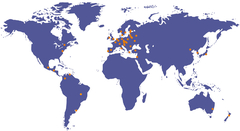Results of the RISM User Study, Part II: Your Comments - Coverage in RISM and Citing Literature
Monday, August 10, 2015

We received hundreds of comments in our recent survey of the online catalog. We are carefully considering each one of them and would like to take some time to address some of the larger issues raised. Today we are talking about coverage in RISM and citing literature. Later this week, we will discuss the chronological limits of RISM and why some libraries have more sources in RISM than others.
This type of comment came up a couple times:
“I find German RISM to be extremely German-centric. My own PhD, my book (OUP), and articles are ignored, as are relevant and important PhDs of English-speaking colleagues. This blinkered approach represents a serious failure to acknowledge non-German research.” -Respondent 160
“I feel like there is too much of a focus on German sources and not enough on sources from Britain (for example). There are great inconsistencies with regards to the sources of particular composers that are available, and some information presented is often inaccurate or poorly cited. I would like to see RISM broaden its focus to be less biased towards German musical sources, and to allow for greater referencing and checking abilities.” -Respondent 161
Short answer: (1.) You’re right, there’s a lot from Germany, and (2.) please send us your articles or other citations so we can add them!
Long answer: Your suspicions are correct: in the RISM online catalog, about 42% of the sources are from Germany, more than any other country. The reason for this can be explained in short in three words: money, time, and staff. There is a fully funded national German working group with eight staff members and two offices. In addition, a number of ongoing grant-funded projects in Germany have stipulations that enable regular contribution of records to RISM. The situation in Germany is unique and is one that, we admit, many countries can only dream of.
Keep in mind that RISM working groups operate independently, meaning there is no central budget that funds worldwide RISM work or staff. (There is a Central Office in Frankfurt–that’s us–but we are also financed separately.) Funding is left up to the individual countries. Other national groups have been fortunate to receive a steady source of funding that enables consistent contributions to the RISM database, Poland and Switzerland being just two examples. More often, RISM work is carried out on a project basis, which results in periods of time with no contributions. This means that if we have a lot of sources from Germany it is only because RISM Germany is able to contribute regularly and in high quantities. We are, of course, grateful for the contributions from all our colleagues around the world.
You can help us tip the balance toward other countries: if you know of a music collection that is not in RISM, perhaps you would be interested in cataloging it? Training and software are free. Contact your national RISM representative or drop us a line: contact@rism.info
The situation of literature in the online catalog is related to the work carried out by our working groups. RISM contributors cite relevant literature, and it makes sense that German musical sources would likely be referenced in the German secondary literature. As part of our editorial work, we at the Central Office cast a wide net and try to enter references to the secondary literature as we become aware of them. Just to name two recent publications, we took note of Maciej Jochymczyk’s catalog of works by Amandus Ivanschiz, cited in our records as JocI, and the “Catalogo della produzione musicale di Giuseppe Corsi” by Giovanni Tribuzio, cited as TriCo, both from 2014.* But, inevitably, there are some things we miss. This isn’t intentional; we likely just haven’t come across them yet. If you would like to call our attention to relevant literature, old or new, we’d love to hear from you. Write to jennifer.ward@rism.info.
In addition, you can find Jennifer Ward and Martina Falletta on Academia.edu and share your research.
* Maciej Jochymczyk, Muzyka religijna u progu klasycyzmu. Amandus Ivanschiz OSPPE (1727–1758) (Lublin: Wydawnictwo Polihymnia, 2014); and Giovanni Tribuzio, “Catalogo della produzione musicale di Giuseppe Corsi,” in “E nostra guida sia la stravaganza”. Giuseppe Corsi da Celano musicista del Seicento: Atti della Giornata di Studio. Celano Auditorium “Enrico Fermi”, 7 dicembre 2013 (Bari: Florestano edizioni, 2014).
Image: Countries around the world with sources in the RISM online catalog.
Share Tweet EmailCategory: New at RISM

